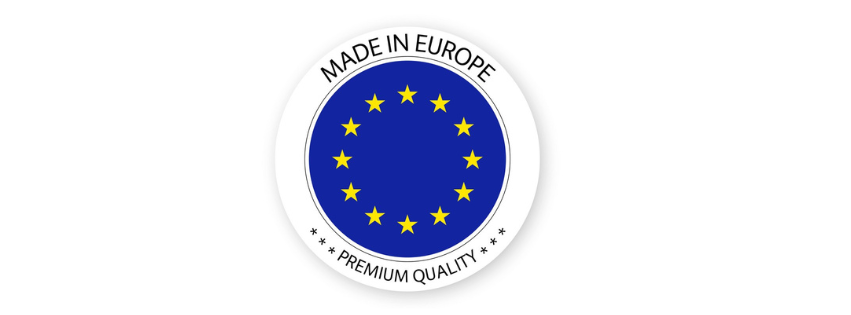
Made in Europe, really?
In the wake of greenwashing, a new phenomenon is gaining ground, particularly within the promotional products market: the emergence of 'made in washing'. How does it operate? By employing various techniques to convince end consumers that a product originates from a European country when, in reality, it hails from another continent. How can we navigate these snares that exploit our preference for local consumption? We've dissected the mechanisms behind the false 'Made in Europe' claim and outlined key factors to remain vigilant about.
There exist numerous strategies to mislead consumers regarding a product's origin or production site:
- Deployment of misleading terms such as '100% designed in Switzerland', 'Italian brand since 1960', 'Born in Paris', or deceptive practices like setting a retail price unrelated to potential local manufacturing.
- Excessive use of color codes associated with the country of origin (e.g., blue/white/red for France) or symbols evocative of the respective nation (e.g., Matterhorn or cross-flag for Switzerland).
- Lack of origin specification on the product ('Made in'), or exploitation of lenient regulations permitting products merely finished in Europe to carry the 'Made in Europe' label.
Let's delve into France as a prime example, given that Swiss legislation still diverges from that of EU nations. Regarded as a stamp of quality and a gesture of support for the domestic economy, the 'Made in France' label garners consumer trust and piques the interest of certain businesses seeking to leverage this trend for sales uplift.
Nevertheless, it's worth noting that the 'Made in France' label can be affixed to products entirely manufactured within France or those partially made within its borders (with a minimum of 50% of total production costs)1. This implies that a T-shirt crafted from cotton grown and woven in India, dyed and cut in China, then assembled in France, may bear the 'Made in France' label, as the predominant operational expenses of this production pertain to the final garment.
"While there are no mandatory national or European regulations necessitating origin marking on products imported into or sold within the EU, exceptions exist for certain agricultural or food items. Origin marking is subject to non-preferential rules of origin, as outlined in the World Trade Organization (WTO) agreement."2
Although the indication of origin is technically optional, it remains subject to legal oversight. The current system allows each company to affix origin indications to their products or promotional materials without upfront verification, except during inspections. Unfortunately, customs authorities primarily focus their checks on international trade flows, resulting in minimal scrutiny for companies operating within Europe and selling exclusively within the EU market.
Moreover, the concept of "non-preferential origin," upon which European legislation is built, can lead to confusion and potentially mislead consumers. This concept defines a good's origin based on where it was wholly obtained or, if produced in multiple countries, where it underwent its final substantial processing.
This lax control regime disproportionately impacts companies committed to local production, hindering their ability to officially validate their practices. It also facilitates the misrepresentation of products as "Made in Europe," undermining market integrity. Fortunately, evolving legislation such as the AGEC law is gradually introducing stricter traceability measures. "Additionally, certification labels like "Origine France Garantie" and "Entreprise du Patrimoine Vivant" offer assurances of a brand or company's local production commitment"3,4
At Inovacomm, the transparency is crucial in the products that we provide. Whether it's releasing the origins of each of the materials or detailing the production process, we try and prioritize compliance with current specifications, certifications and regulations, ensuring that our customers receive products of the highest quality possible.
"Made in Europe" embodies the values of quality, reliability, and craftsmanship. We thoroughly scrutinise and select suppliers who uphold these simple principles which helps us to maintain the utmost transparency and uphold the true essence the "Made in Europe" moto throughout every stage of the production process.
Sources :
1. https://www.ladn.eu/actualite/made-in-france-piege-arnaque-frenchwashing/
2. https://www.douane.gouv.fr/fiche/le-marquage-de-lorigine-made-infabrique-en
Photo: iStock ©


